Yeovil's Friendly Societies
Yeovil's Friendly Societies
From mutual benefit societies to early trades unions
-
Introduction
-
Yeovil
Old True Blue
Benefit Society
-
Yeovil Guardian
Friendly Society
-
Yeovil Perpetual
Benefit Society
-
Yeovil Female
Guardian
Friendly Society
-
Yeovil
Industrial
Provident
Society
-
Protector
Sick Benefit
Society
-
Hearts of
Oak Benefit
Society
-
Temperance
Benefit
Society
-
Yeovil
Temperance and
General
Co-operative
Society Limited
-
Yeovil Mutual
Glove
Manufacturing
Industrial
Society Limited
-
United Glovers'
Mutual Aid
Society
-
British
Workers Sick
Benefit Society
-
Working
Men's Sick
Benefit Society
-
Mendicity
Society
-
Rose Inn
Friendly
Society
- Sons of Temperance Friendly Society
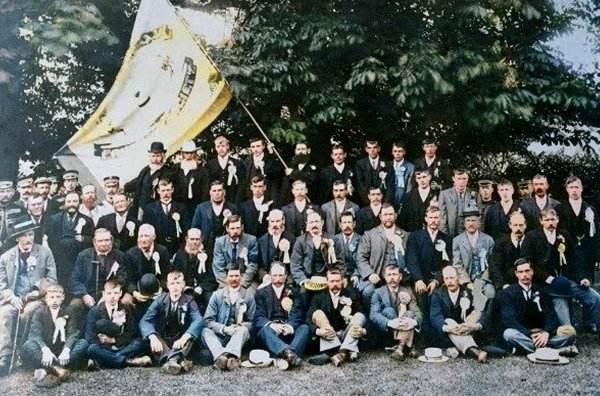
From my
collection
Members of an unknown Yeovil Friendly Society gather for a group (colourised) photograph, probably at the end of a march through the town accompanied by a band - several band members of the band are in the photograph. It was taken by Frederick Christopher who was active in Yeovil from around 1898, thereby giving a rough date for this photograph.
Introduction
A friendly society (sometimes called a mutual society or benevolent society) was a mutual association for the purposes of insurance, pensions, savings or cooperative banking. It was a mutual organization or benefit society composed of a body of people who join together for a common financial or social purpose. Before modern insurance, and the welfare state, friendly societies provided financial and social services to individuals, often according to their religious, political, or trade affiliations. Some societies concentrated their efforts in a financial way, like an early savings bank, while others may have offered members financial support, goods and services when needed - such as during sickness, etc. or having their funeral paid for. Having said that, many of Yeovil's friendly societies had an important social and ceremonial aspect.
Friendly society brasses were the emblems of local friendly societies, common in the west of England between the late 18th and early 20th centuries. The use of brasses as emblems was particularly prevalent in Somerset. On a Society's annual 'Feast Day' or 'Walking Day', usually in spring, the members would hold a parade around the town, with the officers or sometimes all the members carrying poles or staves between four and eight feet (1.2 to 2.4 meters) in length and usually painted. Some poles, also known as rods, wands or 'club sticks', were headed by garlands of flowers, although many West Country poles were headed by a brass finial with a distinctive shape and decorated with ribbons.
"Ilchester District Friendly Society, for instance, purchased '200 Brass Knobs at one shilling each cost price at Birmingham, £18.11s.0d'. This was in 1867 when, at the same time, 234 yards of ribbon at threepence halfpenny per yard was purchased in Yeovil, 'enough for 180 poles'. The poles took 22 days to make at a charge of £3 13s 4d, on top of which £1 was paid for the wood for the poles, while paint and varnish accounted for another £2 10s. The carpenter who provided this service, also charged fourpence each for painting 158 club poles and a shilling each for painting and varnishing two club flagpoles." (Brooke, undated Monograph 7).
"It would not be doing justice to the present inhabitants of this town, were it not also to be recorded that there are various local charities to which they liberally contribute, such as Day and Sunday Schools, Coal Charities, District Visiting, Dorcas, and other Societies. There are also well organized and generously supported Auxiliaries to all the religious Societies of the Metropolis; and it may be safely said, that in proportion to its size and population, Yeovil is not, in this respect, behind any other town in England. It is stated by Mr Tompkins, Secretary of the Yeovil Guardian Friendly Society, an excellent authority upon these matters, that there exist in Yeovil more than thirty Benefit Societies. He states he has received returns from eighteen, from which it appeared that in one year 1,165 sick members had received pay, amounting to £445 17s 9d, and on account of funerals, £242 1s, making a total of relief afforded, £687 15s 9d." (Daniel Vickery, 1856).
|
From the
diary of
Louisa
Harris ....
|
Yeovil Old True Blue Benefit Society
At one time Yeovil boasted many friendly societies, one of the earliest Yeovil friendly societies to be established, in 1782, was the Yeovil Old True Blue Benefit Society. It was often known as the Old Pall Club because it met in the Pall Tavern in Silver Street and appears to have been constituted for a set period, usually seven years, and at the expiration of the period immediately re-constituted for a further period, and so on.
The Dorset County Chronicle reported in June 1846 "The Yeovil Old True Blue Benefit Society dined at the Pall Inn, the repast being served with superior excellence by the respected host, Lukins. Mr Edmund Henning ably presided, Mr Thomas Busby discharging the duties of the Vice-Chair. At the close of the interesting proceedings, Mr Charles Minchington was elected President for the ensuing year.
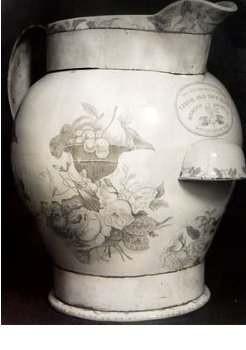 In 1855 the
Sherborne
Mercury reported
"This Society
having reached
the expiration
of the term of
seven years on
22 May, for
which period it
was formed,
divided the sum
of £431 19s 5½d
(around £19,000
at today's value)
amongst its then
existing
members.
From
the published
statement it
appears that
during its
establishment
there have been
paid to sick
members £228
10s, and to
relatives or connexions of
deceased members
towards burial
£137 6s, in
addition to £50
5s for deceased
wives; showing a
total benefit to
members of £416
1s.
On
Whit-Monday the
anniversary was
held, when it
was determined
to re-establish
a new Benefit
Society upon
better
principles and
from 80 to 100
members joined."
In 1855 the
Sherborne
Mercury reported
"This Society
having reached
the expiration
of the term of
seven years on
22 May, for
which period it
was formed,
divided the sum
of £431 19s 5½d
(around £19,000
at today's value)
amongst its then
existing
members.
From
the published
statement it
appears that
during its
establishment
there have been
paid to sick
members £228
10s, and to
relatives or connexions of
deceased members
towards burial
£137 6s, in
addition to £50
5s for deceased
wives; showing a
total benefit to
members of £416
1s.
On
Whit-Monday the
anniversary was
held, when it
was determined
to re-establish
a new Benefit
Society upon
better
principles and
from 80 to 100
members joined."
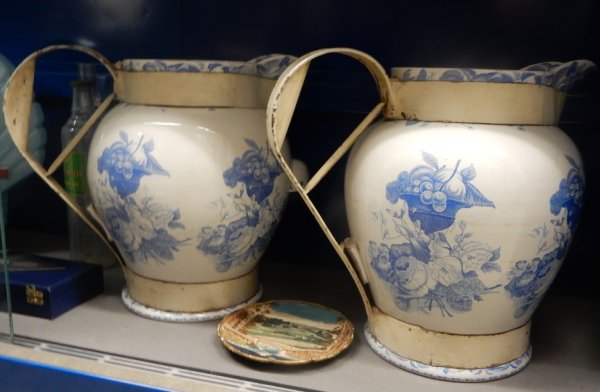
Courtesy of South Somerset Heritage Collection
The two Yeovil Old True Blue Benefit Society jugs held at the Community Heritage Access Centre. Both have lost their handles in the past (they would be remarkably heavy when filled with liquid) and have been fitted with metal collar & handle combinations. For an idea of size, the rectangular image on the small plate at the centre, is a postcard measuring about 5" (125mm).
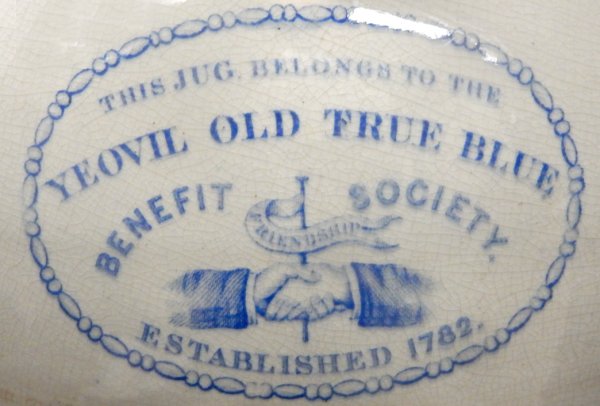
Courtesy of South Somerset Heritage Collection
This is the decoration on the jug just below the pouring lip and above the supporting shell grip handle. The large jugs are about 18" (460mm) high. Two are held in the Community Heritage Access Centre, Yeovil.
In 1857 the Sherborne Mercury reported "The income of the society for the past year amounted to about £110 (around £9,000 at today's value), and the expenditure £50 12s 11d, including £24 15s paid to sick members, leaving a balance from this and previous years of £130 15s. The society has at present ninety-seven members."
A note in the 21 May 1864 edition of the Somerset County Gazette recorded "The anniversary of the Old True Blue Benefit Society took place on Whit-Monday. Nearly 200 members paraded the streets, headed by the brass band of the 16th SRV (Somerset Rifle Volunteers). They afterwards marched to the Pall Inn and partook of an excellent dinner. The merry bells of St John's church rang throughout the day."
Yeovil Guardian Friendly Society
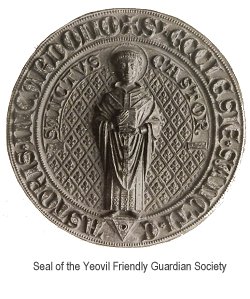 The
Yeovil Guardian
Friendly Society,
founded on 29 June
1835, had its
headquarters at
the
Mermaid Hotel
in
High Street
and consequently
was also known
as the
Mermaid Club.
In its edition
of 6 June 1846
the Sherborne
Mercury reported
"On Tuesday the
Yeovil Guardian
Friendly Society
held their
Anniversary; the
members, 248 in
number,
assembled at the
Mermaid Inn, and
forming into
procession, with
their splendid
flags and
banners, and
headed by our
very superior
brass band,
marched to
Church." The
Dorset County
Chronicle added
"The procession
was unusually
grand and
imposing. The
members visited
Pen House,
the seat of
John Slade,
where they were
regaled by that
worthy gentleman
with a liberal
supply of his
prime old stingo.
Mr
Josiah Hannam
presided at the
dinner, with his
usual ability,
humour and tact.
The statement of
the Secretary
showed the club
to be in a very
flourishing and
satisfactory
way. The wives
and female
relatives of
both societies
were entertained
and joined in
the merry dance.
It is always
gratifying to
attend the
anniversaries of
these
well-regulated
societies,
because the
greatest
cordiality and
kind feeling
ever exists
Among their
respective
members."
The
Yeovil Guardian
Friendly Society,
founded on 29 June
1835, had its
headquarters at
the
Mermaid Hotel
in
High Street
and consequently
was also known
as the
Mermaid Club.
In its edition
of 6 June 1846
the Sherborne
Mercury reported
"On Tuesday the
Yeovil Guardian
Friendly Society
held their
Anniversary; the
members, 248 in
number,
assembled at the
Mermaid Inn, and
forming into
procession, with
their splendid
flags and
banners, and
headed by our
very superior
brass band,
marched to
Church." The
Dorset County
Chronicle added
"The procession
was unusually
grand and
imposing. The
members visited
Pen House,
the seat of
John Slade,
where they were
regaled by that
worthy gentleman
with a liberal
supply of his
prime old stingo.
Mr
Josiah Hannam
presided at the
dinner, with his
usual ability,
humour and tact.
The statement of
the Secretary
showed the club
to be in a very
flourishing and
satisfactory
way. The wives
and female
relatives of
both societies
were entertained
and joined in
the merry dance.
It is always
gratifying to
attend the
anniversaries of
these
well-regulated
societies,
because the
greatest
cordiality and
kind feeling
ever exists
Among their
respective
members."
The first trustees of the society were glove manufacturer John Ryall Mayo, Samuel Glyde, druggists and chemists George Wellington and his son George Wellington Jnr, and glove manufacturer Samuel Duffett.
The society often paraded at local events with their banner including the opening of the railway in Yeovil in 1853. In 1855 the Sherborne Mercury reported "These societies appear to be conducted upon correct principles, and are managed with praiseworthy care and ability. They accomplish much good at periods of unmistakable necessity and sorrow, encouraging habits of fore-thought."
In June 1857 the Sherborne Mercury reported "The income of the society last year, including £73 16s 8d interest on principal stock, amounted to £389 3s 11d (about £32,000 at today's value), and the expenses, including £155 2s paid to sick members, £187 6s 5d. The present number of members is 329."
By 1863 the society had a membership of more than 300. It was noted in the 21 May 1864 edition of the Somerset County Gazette that "The annual meeting of the Yeovil Guardian Friendly Society took place at the Mermaid Hotel, on Tuesday, for the purpose of presenting the usual statement of accounts and electing medical men. Mr F Tomkins was re-elected, and Dr PS Colmer was elected in the place of Dr Aldridge."
In 1882 Whitby's directory noted "Yeovil Guardian Friendly Society, Established 29th June 1835. Pay night, every fourth Monday at the Town Hall. Secretary Henry Cary Tompkins."
In a newspaper article in 1892, J Edwards recalled "One of the vanished features of Yeovil is its old friendly societies, more particularly the old Mermaid Club (or Yeovil Guardian Friendly Society) and the Old Pall Club (or Yeovil True Blue Friendly Society). The latter paraded the town and attended church on Whit-Mondays, the former on Whit-Tuesdays. On both days hundreds of people flocked to the town from far and near, and there was a band playing, bell-ringing, and fun in abundance. Each club was composed of hundreds of members."
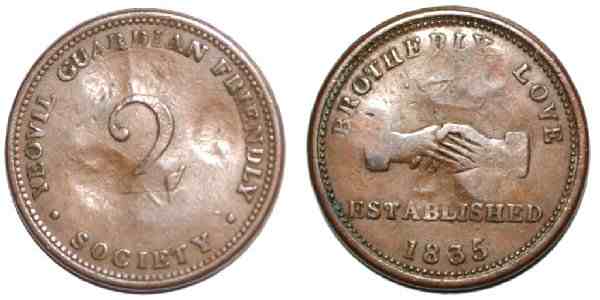
This extremely rare two-penny token from my collection was issued by the Yeovil Guardian Friendly Society. The token is 29.2mm in diameter and 1.8mm thick. The obverse reads "YEOVIL GUARDIAN FRIENDLY SOCIETY" around a central number 2. The reverse has the words "BROTHERLY LOVE" over a pair of shaking hands above "ESTABLISHED" over "1835".
"The
Yeovil
Guardian
Friendly
Society
also
issued
tokens
and
these
are
considered
very
rare, in
fact
there
was no
known
examples
of them
until
two came
to light
in the
1990's.
One
token
was
gifted
to the
Community
Heritage
Access
Centre
from a
museum
in
Wakefield,
Yorkshire."
(CHAC
website).
Illustrated below, the large and almost unique commemorative medallion in my collection (there is one other known example which is in the Community Heritage Access Centre), was issued by the Yeovil Guardian Friendly Society.
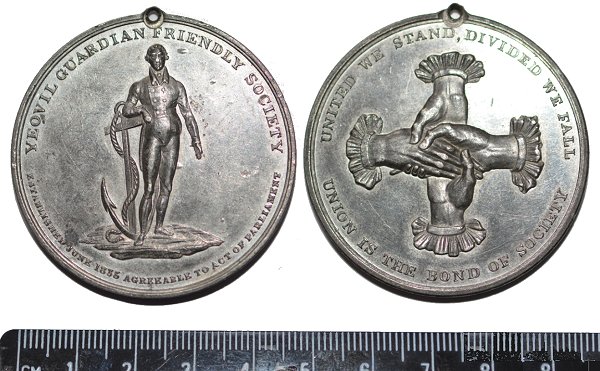
The medallion is 48.5mm in diameter, 4.1mm thick and weighs 1.6 oz (46g). The obverse reads "YEOVIL GUARDIAN FRIENDLY SOCIETY" around the top edge and "ESTABLISHED JUNE 1835 AGREEABLE TO ACT OF PARLIAMENT" around the bottom edge with a central figure of a naval officer, presumably Horatio Nelson, supporting an anchor. The reverse reads "UNITED WE STAND, DIVIDED WE FALL" around the top edge and "UNION IS THE BOND OF SOCIETY" around the bottom edge with a central motif of four shaking hands.
See also Yeovil Trade Tokens and Checks
Yeovil Female Guardian Friendly Society
The Yeovil Female Guardian Friendly Society was formed in 1835 and on 7 September the Sherborne Mercury reported "A new female friendly society, to be called the 'Yeovil Female Guardian Friendly Society' has been established and held their first meeting on Monday last, at the Choughs Inn, when forty-seven respectable young females enrolled their names as members of the same. Mr JT Vining, Mr Porter and Mr B Ryall have consented to act as trustees. The rules and regulations of this society are similar to those of the male society of the same name, and held at the same house, which have received the approval and signature of John Tidd Pratt, Esq, the revising barrister. Both of these societies are rapidly increasing in numbers, and will, no doubt, in a short time equal, if not exceed any benefit society in Yeovil or its neighbourhood. The funds are not to be appropriated to any other purpose than the benefit of the members in case of sickness or death, and at the expiration of fourteen years are to be divided (leaving in the hands of the trustees one whole year's subscription, and all honorary subscriptions to meet the current expenses,) in equal proportion, according to the time the respective persons having been members thereof. As the benefits resulting from such societies are unquestionable, it is to be hoped that they will meet with the patronage and support of the resident gentry in the town and neighbourhood."
Sadly, nothing more is known about this society.
Yeovil Perpetual Benefit Society
A rival group to the Guardian Friendly Society, the Yeovil Perpetual Benefit Society, was instituted the same year of 1835. The Western Flying Post reported on 10 August 1835 (see below) "Another Benefit Society, to be called the Yeovil Perpetual Benefit Society, has been established, to be held at the Greyhound Inn; the rules and regulations of which are drawn up with great ability, and on truly equitable principles; 58 persons have already entered as members, and the following young gentlemen have consented to act as trustees :- Mr Frederick Greenham, Mr William Bide, Mr Augustus Bide."
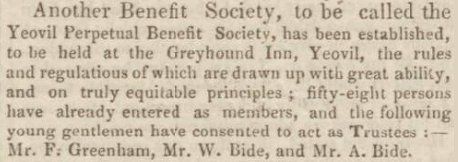
At their fourth annual meeting held at the Pall Inn, 1839, their funds stood at £406 (in excess of £31,000 at today's value), and they marked the occasion by attending divine service at St John's church in the morning followed by a dinner at 3pm.
By 1861 the name of the society had become the 'Yeovil Perpetual Equitable Benefit Society'.
The society was certainly still active in 1887 when Joseph Ridout, a 77-year old retired glover, brought an action against the society "for expelling him from the Club." The Bench awarded against the Society and awarded Mr Ridout compensation "for what he was entitled to, together with all legal costs."
Yeovil Industrial Provident Society
The Yeovil Industrial Provident Society was an early society in Yeovil based along similar lines to the Co-operative Societies. The society was established in 1860 under the Independent and Approved Society Act of 1852, but only lasted until 1868. In 1860 it produced a 16-page rulebook entitled "Rules of the Yeovil Industrial Provident Society", published by the Western Flying Post office. The society issue £1 shares to a maximum of one hundred, and arranged loans from £5 and upwards at 6% per annum. The original committee comprised James Henry Bicknell, Henry Yeo and George Chant, with Simon Watts as Secretary.
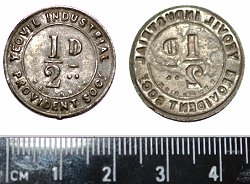 |
The rare ½d dividend check or token in my collection, shown at left, was issued by the society and the short life of the society dates the token with some accuracy. The token is 22mm in diameter, 0.75mm thick and made of stamped, tinned iron. |
See also Yeovil Trade Tokens and Checks
In December 1861 the Western Flying Post reported (see below) ".... the one great object (of the society) is to induce operatives to deposit money, which they may draw when necessary, in the shape of unadulterated food. When we italicise the word 'unadulterated' we by no means intend to cast a reflexion upon the character of our tradesmen; but that an immense amount of adulterated food is consumed by the public, and especially the poor, is a matter of notoriety."
Whereas most of the early friendly societies only operated with cash handouts to members, it appears that the Yeovil Industrial Provident Society actually had its own store for members along the lines of the Co-operative movement.
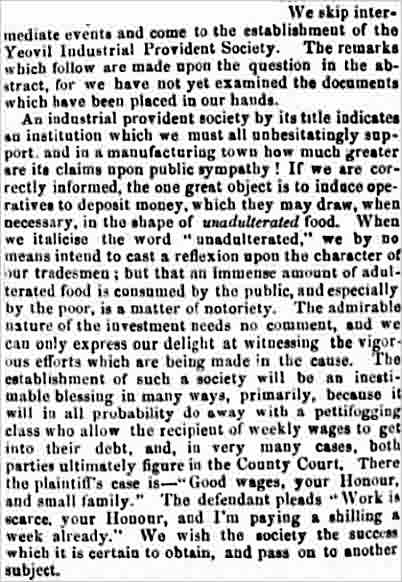
The article from the 17 December 1861 edition of the Western Flying Post outlining the intended operation of the society in the provision of 'unadulterated' food to its members.
The following report is from the 15 April 1862 edition of the Sherborne Mercury "The first quarterly report of this society has just been published. The cash account shows that the receipts during the past quarter for goods sold at the stores amounted to £207 5s 6d (around £17,000 at today's value). There are in the bankers hands £31 19s 9d; in the hands of the treasurer £2 12s 4½d, and the storekeeper has a balance of 5s 6d. The stock in trade is estimated at £108 1s 9d and the fixed stock at £3 15s, which gives the amount of assets at £146 14s 4½d. The liabilities are - members' claims as per ledger £130 6s 6d, and interest on paid up capital at £1 2s 11d, which gives a clear profit on the quarter of £15 4s 11½d. The Society has only recently been established, but it appears to be in flourishing condition."
In April 1863 the Western Gazette reported "The advantages enjoyed by members are... threefold, first, they get better interest for their money than they could obtain at a savings bank; secondly, they are secured against adulteration; thirdly, they get a pound's worth of goods for 18s 6d. The committee has decided on supplying each member with 'The Co-operator' - the organ of the co-operative movement - monthly, at the Society's expense. We understand that the Society has purchased more eligible premises than those they now occupy, and that, in a few months, it will make its appearance in Middle Street."
Sadly, the society was not to endure....
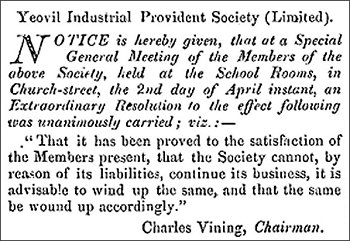
This notice, winding up the society, was placed in the 14 April 1868 edition of the London Gazette, the society's freehold premises in Middle Street having been sold by auction on 15 January 1868 at the Castle Inn.
Yeovil Protector Sick Benefit Society
This society was formed in 1876 and was still operating in 1890. in In its edition of 23 December 1887, the Western Gazette reported on the annual meeting of this society at the club-rooms in Church Street under the presidency of Mr Henry Tutchings. The statement of accounts showed the income of the Society to have been £299 13s 4d for the year, out of which the sum of £86 6s had been paid to sick members, £38 1s for deaths; £25 6s 3d to the medical fund and other payments of £9 16s 6d, leaving a balance of £140 3s 7d.
No further information at this time.
Hearts of Oak Benefit Society
In its edition of 29 April 1887, the Western Gazette reported on a meeting of this society at the Globe & Crown Hotel "when it was decided that the Society should be represented in the procession at the coming jubilee celebrations. A committee was appointed to carry out arrangements."
No further information at this time.
Temperance Benefit Society
In its edition of 31 January 1873 the Western Gazette reported " A Temperance Benefit Society has been formed in the town. It is open to all abstainers. Any person desirous of joining can do so by applying to any of the members of the 'Hope of Yeovil' and 'Yeovil Come and Welcome' Lodges, or to Mr W Johnson, Park Street, the Secretary. It is hoped that many will avail themselves of this movement."
No further information at this time.
Yeovil Temperance and General Co-operative Society Limited
The Yeovil Temperance and General Co-operative Society Limited was created in 1875, some fourteen years before the Yeovil and District Co-operative Society was founded.
No further information at this time.
Yeovil Mutual Glove Manufacturing Industrial Society Limited
The Yeovil Mutual Glove Manufacturing Industrial Society Limited made its appearance in 1868 in Yeovil where, of course, the main industry was gloving. The Taunton Courier and Western Advertiser reported on 15 July 1868 "A society has been established in this town under the title 'The Yeovil Mutual Glove manufacturing Industrial Society (Limited)', the members of which are working glovers, who have resolved to try the principle of co-operation. The first meeting of the members has been held this week, and a public meeting is shortly to be announced, when a full explanation of the principles and policy of the society will be given."
No further information at this time.
United Glovers' Mutual Aid Society
Later, the United Glovers' Mutual Aid Society, also based in Yeovil, was another mutual aid society that merged with the Amalgamated Society of Glovers in 1920 to form the National Union of Footwear, Leather and Allied Trades. This was a national trade union based in Yeovil which existed until 1971, representing workers in the glove-making and leather industry.
British Workers Sick Benefit Society
Always keenly interested in the friendly society movement, William Culliford was instrumental in founding a sick benefit society - the British Workers Sick Benefit Society - in 1874. He was the first president and treasurer and held office for 60 years. The society boasted a membership of 2,000, but the introduction of National Insurance bought it to an end.
Working Men's Sick Benefit Society
This was also the fate of the Working Men's Sick Benefit Society, of which Mr Culliford was secretary and treasurer for 29 years.
Mendicity Society
The Dorset County Chronicle reported "It is in contemplation to establish a Mendicity Society (whose headquarters were in London) at Yeovil. We should be glad to hear of there being such an institution in every town in the kingdom; as thereby relief would be invariably afforded to objects in real distress: whilst the trade of begging (their italics, not mine) would be lessened, and probably annihilated."
The Yeovil branch of the Mendicity Society was formed in 1832. "The society gives meals and money, supplies mill and other work to applicants, investigates begging-letter cases, and apprehends vagrants and impostors. Each meal consists of ten ounces of bread, and one pint of good soup, or a quarter of a pound of cheese. The affairs of the Society are administered by a Board of forty-eight managers. The Mendicity Society's tickets, given to a street beggar, will procure for him, if really necessitous, food and work". A mendicant (from the Latin mendicans, meaning "begging") is one who practices mendicancy (begging) and relies chiefly or exclusively on charitable donations to survive.
In its edition of 8 March 1832, the Western Flying Post reported that at the annual meeting of the Mendicity Society at Yeovil there had been 1,076 applicants for relief of which 927 received relief, the total amount of relief amounting to £22 (around £17,000 at today's value, using the 'Labour Earnings' algorithm). The Society had been approached by 149 'imposters', two of whom had been prosecuted.
In June the same year the Sherborne Mercury reported "Caution - On Wednesday last Thomas Jones, a vagrant and a native of Bideford, who feigned himself to be dumb, and having been insolent to the Secretary of the Mendicity Society recently established at Yeovil, was very justly sentenced by John Newman Esq, of Barwick House, to one month's hard labour in the house of correction at Wilton.... It is the intention of the officers of the above Society to institute a very rigorous inquiry into the cases of all who apply to be relieved from its funds."
The Mendicity Society was involved in the manslaughter case against James Beare, watch-man of Yeovil, in 1838, when a mendicant in search of work as a collar-maker applied to the manager of the Mendicity Society (William Porter) for relief, at about 10 o'clock on the night in question. The rules of the society did not permit the granting of relief after 9 o'clock at night nor to individuals labouring under intoxication. The beggar was locked up in the watch-house, where he died. For full details of the case - see here.
Rose Inn Friendly Society
As reported in the Western Gazette's edition of 16 January 1864 - "A friendly society has recently been formed at the Rose Inn, Wellington Street. Mr Foot, the host, invited about twenty of the members to supper on Monday night. An excellent spread was provided and the supper was succeeded by toasts, speeches, songs and recitations, 'The Old Oak' sung by Mrs Hutchings, and a recitation by Mr Lawrence, were loudly applauded. The health of host and hostess were enthusiastically drunk." Nothing more is known of this society.
Sons of Temperance Friendly Society
The Sons of Temperance Friendly Society was most active in Yeovil during the late 1880s and 1890s. By 1890 Whitby's Yeovil Almanack Advertiser noted that the Society had accumulated funds of £195,000 (around £120 million at today's value - presumably the assets of the whole Society, not just the Yeovil branch!), The Society offered immediate Medical Benefit with Sick Benefits from 5/- to 20/- per week. Full Benefit was given for twelve months, half Benefit for twelve months and then a quarter Benefit for the remainder of the illness. Death Assurance was from £5 to £50 and one payment covered all with no management or other levies.
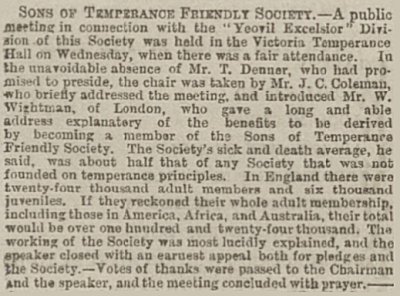
A report from the 16 August 1889 edition of the Western Gazette.
gallery
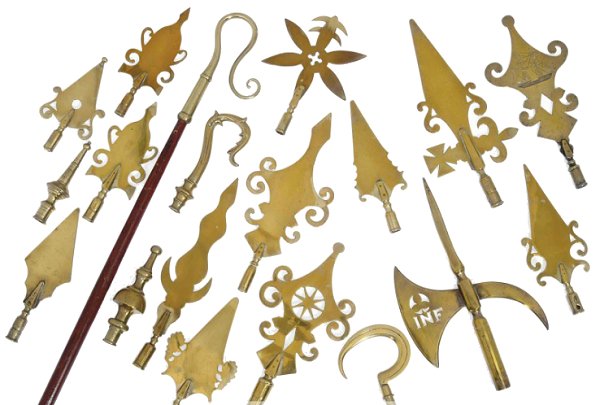
A selection of 19th century Somerset friendly society brass pole-heads.